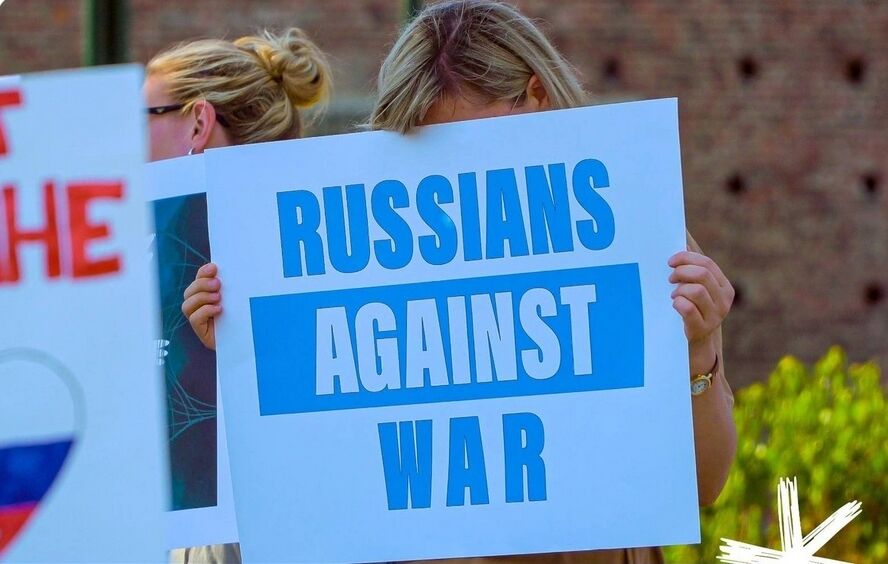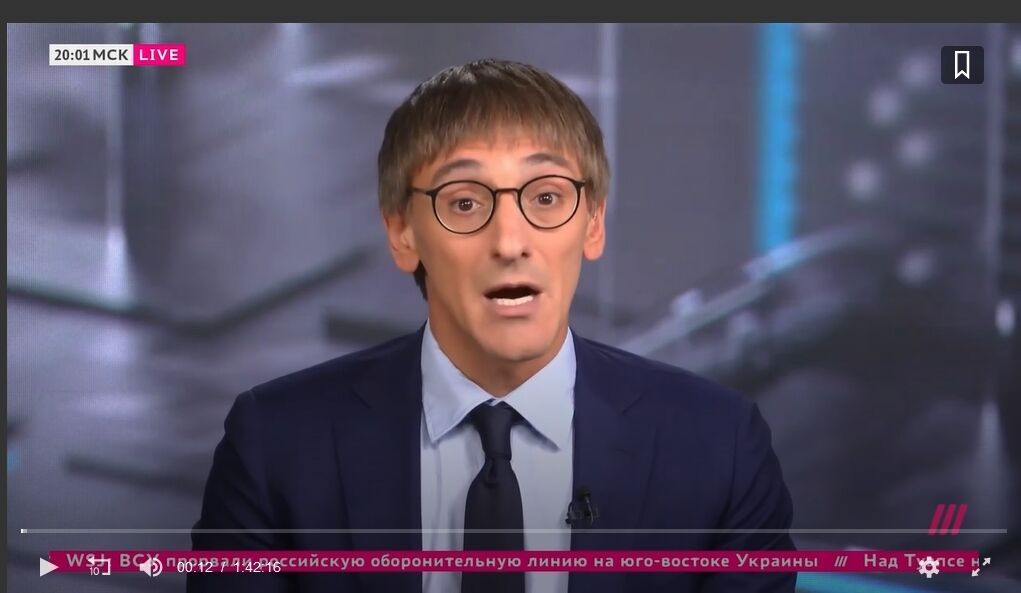Europeans should allow their countries to be hosts for free debate among the Russian emigrés of the 21st century. But they should resist the temptation to view the exiles as channels of influence to reform Russia, argues Kadri Liik of the European Council on Foreign Relations.
 Photo from twitter @4freerussia_org
Photo from twitter @4freerussia_org
by Kadri Liik
Life as a refugee is always difficult. And being a Russian exile in Europe is difficult in its own way. You are blamed for the war you opposed. You might fight the blame, or you might own it and try to atone – either way, there is little you can do. And what you are able to do inevitably proves inadequate: it is hard to convince Europeans that Russian society does not bear blame for Vladimir Putin’s war; and you can never apologise enough to shake away the guilt. Alternatively, you might be of the opportunistic type, who arrives with a sense of entitlement in search of the good life – and also ends up disappointed by the cool welcome. Either way, you start slowly losing touch with home, while never quite agreeing with the worldview of your new neighbours.
The politically motivated exodus of Russians to Europe started slowly in around 2012 and dramatically intensified over the past year and a half. The exiles come with a panoply of views. There are those who indeed feel guilty about the war, because, as Russian citizens, they feel responsible for failing to prevent it. There are those who think of themselves first and foremost as victims of the Putin regime and refuse to be answerable for its crimes. There are those who do not bother with questions of guilt at all, but just come in search of a safe haven – for their money, perhaps, or from mobilisation. There are those who worked for the Putinist system before becoming disillusioned or falling out of favour; there are those who kept their distance from the very start. And finally, there are surely those who have not truly fled at all, but have been planted among the refugee community by the Russian special services.
Embrace them, reject them or put them on probation?
Europeans and the European Union lack a common policy towards the exiles. While Ukrainian refugees will correctly remain Europeans’ priority, what should European decision-makers do about the fleeing Russians: embrace them; reject them; or put them on probation?
Some in Europe view the exiles as our best link to civil society in Russia; as a group who could be instrumental to democratising the country in the future. They suggest welcoming them, helping them, and working with them. Behind the scenes, though, many others, especially European officials working on security matters, are governed by caution: ‘We don’t know who these people really are,’ they say in private. ‘They might be anti-Putin, they might be undercover FSB. And if they are effective in their anti-Putin activities, the Kremlin might send assassins after them – which won’t help our security either.’
 Anchor Mikhail Fishman presenting news of TV Dozhd from the studio in Amsterdam. Screenshot from tvrain.tv
Anchor Mikhail Fishman presenting news of TV Dozhd from the studio in Amsterdam. Screenshot from tvrain.tv
A third approach is to approve of Russians as long as they think and behave in particular ways. In many places the exiles are welcome as long as they conform to local expectations, which vary widely, and are maximalist in some places. A good illustration of this is the fate of TV Dozhd. Russia’s last-remaining liberal television channel moved its operations to Latvia, but soon lost its licence for its programming’s lack of Latvian subtitles, for referring to the Russian army as 'our army,' and for using (probably accidentally) a map that showed Crimea as part of Russia. Consciously or otherwise, the Latvian government seems to have hoped TV Dozhd would become essentially a Russian-language Latvian television channel, taking Riga’s official line and helping to sway the views of Latvia’s extensive Russian diaspora. When TV Dozhd continued to operate as part of the Russian debate and media landscape – hence its reference to the Russian army as 'ours' – it went beyond the bounds of the expectations of the Latvian authorities.
All approaches have their logic and merit. All have shortcomings too.
Weakening links with Russian society
It is likely true that, for the time being, the exiles are Europe’s best link to Russian society. Most have friends and family in Russia, with whom they communicate on a daily basis. However, if the standoff endures, over time these links will weaken. Former friends, some of whom stayed, some of whom left, will take separate paths in life. They will be part of different debates, with different social codes. The exiles will slowly lose their authentic ‘feeling’ for Russia; they could start projecting their own hopes and fears upon reality. At that point, anyone who relies on the political analyses of the exile community alone will need to start double-checking its members’ assessments.
It's risky to rely on the political analyses of the exile community alone
It is also hard to say what part the exile community can play in post-Putin Russia. To an extent this will depend on the length of time they are away. The Russians who fled the Bolshevik revolution after 1917 believed they would soon head back – and as a result lived out of suitcases for most of their lives. By contrast, those who left in the 1970s and 1980s expected never to return – but many had done so by the early 1990s. We simply do not know what the future holds for today’s emigrés.
It is also impossible to predict the influence they will have if they go back. In some societies – the Baltic states, for instance – returning exiles adapted smoothly and played important political and social roles following the collapse of the USSR. Not so in Russia – in the 1990s, the homegrown networks of post-Soviet Russian politics proved fairly impenetrable to those who had been away. This may change after Putin; or it may not.
Uniform policy in EU unlikely
It is unlikely that Europeans will ever have a truly common policy towards their Russian exile community. The questions of Russia and Russians are of different levels of sensitivity in different countries, and different states’ policies will always reflect that. Accepting this will make life easier for everyone, and Europe is diverse enough to welcome Russians in various ways. For instance, TV Dozhd may have moved to Latvia in the hope of being close to Russia in a town inhabited by exiles. But ultimately it may be better off in its new home in the Netherlands, where society is less instinctively suspicious of everything Russian.
Also, much of what regulates the daily life of Russian exiles – rules on visas, border crossing, residence permits, asylum – will remain in the competence of interior ministries, and thus outside the regulatory reach of the EU. Its institutions may still wish to draw up a list of recommendations or best practices, which could help member states at least streamline their actions, so that unilateral steps by some do not leave others exposed. (Think, for instance, of how the visa bans introduced by the Baltic states last year increased the migration pressure on Finland and Norway – until they too restricted the movement of Russians.) This would also help address the Kafkaesque set of regulations inside the EU faced by the exiles. But truly uniform policies across the bloc or the Schengen visa space are probably unrealistic for the time being.
Allow Russians space to live and to talk freely about Russia
Of course, the exiled Russians need to adapt to the societies where they have settled. They need to follow local rules and laws, and put up with local views about Russia – there is no avoiding that. However, their hosts should allow them to be themselves – Russian Russians – not just Russian-speaking Europeans.
Do not instrumentalise exiles
Ultimately, Europeans’ approach should be to provide space for Russians without over-investing in them or instrumentalising them. Allow them space to live, safe from the Kremlin. Enable them to talk freely about Russia – painful and necessary as it is. For now, exile is the only place where there can be a Russian debate about the country’s political system, how to fix it, and how to atone for its crimes. Parts of their soul-searching may connect with the discourse in Russia, although there is no guarantee of this. But above all, Europeans should not view them as a column that will smash the Putinist regime. Do not embrace them as such, do not project your hopes onto them, and do not try to micromanage Russian politics with the help of exiled political leaders (even if they ask you to).
Do not project your hopes on them
The rationale for welcoming Russians should be that Europe is Europe: a place that provides shelter for refugees and a home for honest debate. Europeans’ reasoning should not be rooted in any expectations about the political influence exiles will have in a future Russia – because that may never materialise. If those who departed eventually acquire such influence, it will be a welcome surprise. Above all, the more that Europeans steer clear of intra-Russian intrigues and political manipulation, the more likely it is that such influence will be worth the steadfastness of circumspection.
